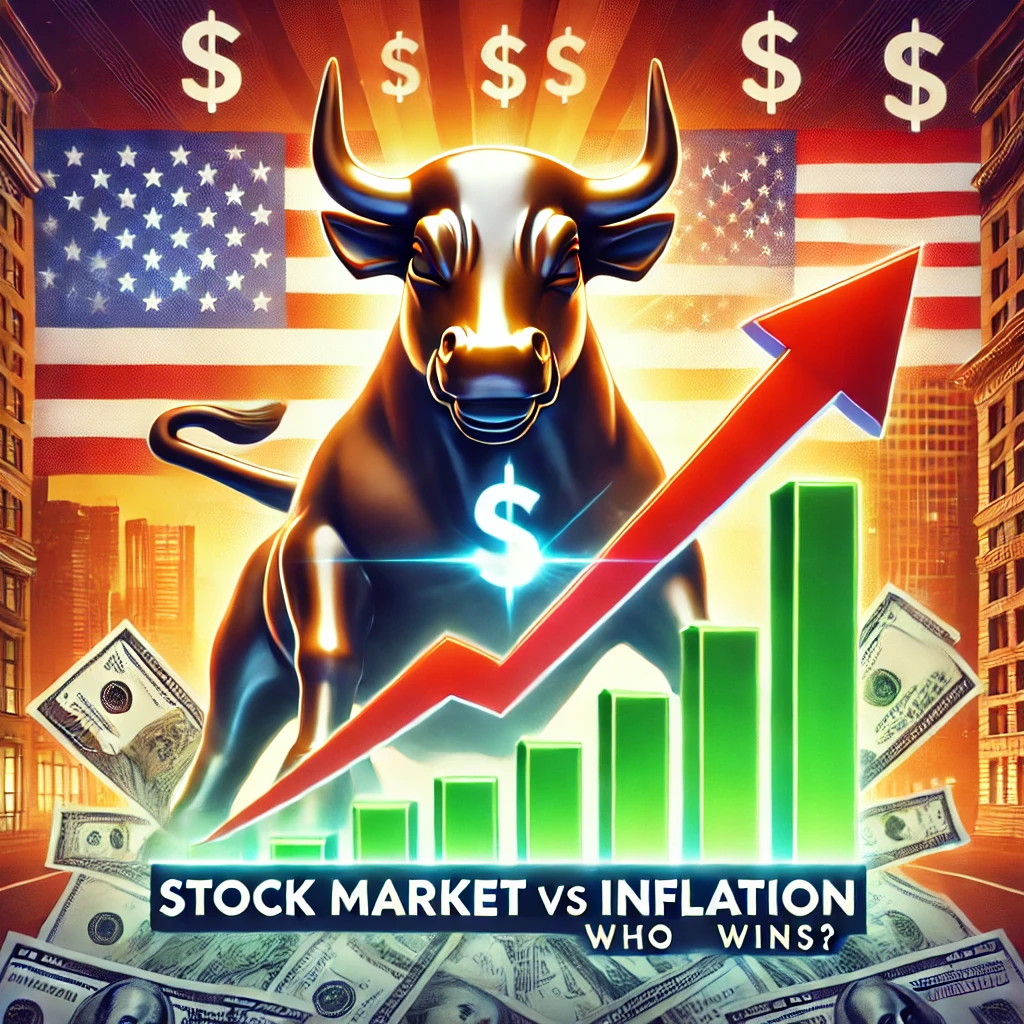The U.S. stock market has remained resilient despite various economic challenges. With inflation coming back, many investors wonder whether the market can sustain its momentum. This article explores why the stock market may continue to perform well even as inflation increases and provides deeper insights into the factors shaping the current economic landscape.

- The Relationship Between Inflation and the Stock Market
- How the U.S. Stock Market Can Stay Strong Despite Inflation
- Sectors That Benefit During Inflation-U.S. Stock Market
- Risks to Watch for Investors-U.S. Stock Market
- Strategies for Investors in an Inflationary Market
- Conclusion-U.S. Stock Market
- Disclaimer
The Relationship Between Inflation and the Stock Market
Inflation impacts various sectors of the economy in different ways. Historically, rising inflation has led to increased volatility but not always a market downturn. The stock market’s performance often depends on corporate earnings, consumer demand, and Federal Reserve policies. Investors need to understand how different asset classes react to inflationary pressures to make informed decisions.
Why Inflation Is Rising Again
Several factors are driving the recent rise in inflation:
- Supply Chain Disruptions: Ongoing global supply chain issues continue to push prices higher, creating bottlenecks in production and logistics.
- Increased Consumer Demand: Post-pandemic recovery has led to increased spending, with people resuming travel, shopping, and dining out at higher rates than before.
- Rising Energy Costs: Oil and gas prices remain high, contributing to inflationary pressure. The geopolitical landscape, including conflicts and trade restrictions, further exacerbates this issue.
- Government Policies: Stimulus packages and federal spending have injected money into the economy, fueling inflation. Fiscal policies designed to aid economic recovery have also contributed to increased consumer liquidity.
- Wage Growth: Rising wages, while beneficial for workers, have led to higher production costs for businesses, which in turn pass these costs onto consumers.
How the U.S. Stock Market Can Stay Strong Despite Inflation
1. Corporate Earnings Growth
Companies with strong pricing power can pass rising costs onto consumers, maintaining their profit margins. Sectors like technology, healthcare, and consumer goods tend to adapt well to inflationary periods. The ability to innovate and provide high-demand products helps these companies maintain profitability.
2. Federal Reserve Policy Adjustments
The Federal Reserve plays an important role in controlling inflation. By adjusting interest rates strategically, it prevents excessive market panic while keeping inflation in check. Interest rate hikes can slow down inflation but also create challenges for borrowers and investors. However, the Fed’s balanced approach has historically helped prevent major economic downturns.
3. Stock Market as an Inflation Hedge
Historically, equities have outperformed other asset classes during inflationary times. Assets like real estate investment trusts (REITs), commodities, and dividend-paying stocks provide additional protection against inflation. Stocks that offer consistent earnings growth and strong cash flows are more likely to withstand inflationary pressures.
4. Strong Labor Market and Consumer Spending
A robust labor market leads to increased wages and sustained consumer spending. This supports company revenues, helping the stock market remain stable. Despite inflation, low unemployment rates and rising salaries ensure that people continue to spend, driving business growth.
5. Technology and Innovation Driving Growth
Companies investing in artificial intelligence, automation, and renewable energy continue to drive economic growth, keeping stock valuations strong. The technology sector is particularly resilient due to its ability to generate high margins and maintain demand despite economic fluctuations.
Sectors That Benefit During Inflation-U.S. Stock Market
While inflation poses risks, some sectors tend to perform well:
| Sector | Why It Benefits |
|---|---|
| Energy | Rising oil prices increase revenue for energy companies. |
| Technology | Innovation helps maintain strong earnings despite inflation. |
| Healthcare | Demand for healthcare remains constant regardless of inflation. |
| Consumer Staples | Essential goods see steady demand even during economic uncertainty. |
| Real Estate | Property values often rise alongside inflation. |
| Financials | Banks and financial institutions benefit from higher interest rates. |
| Commodities | Gold, silver, and agricultural products act as hedges against inflation. |
Risks to Watch for Investors-U.S. Stock Market
While the market may hold up, there are risks investors should monitor:
- Overvaluation: High stock prices can lead to corrections, especially in speculative sectors.
- Interest Rate Hikes: Aggressive rate increases can slow down economic growth and negatively impact high-growth companies.
- Geopolitical Uncertainty: Global conflicts, trade wars, and economic sanctions can impact market sentiment and disrupt supply chains.
- Supply Chain Disruptions: Ongoing supply chain issues may affect certain industries, leading to production delays and increased costs.
- Consumer Confidence Decline: If inflation rises too quickly, consumers may cut back on discretionary spending, affecting corporate profits.
- Debt Burden: Rising interest rates increase borrowing costs for companies and individuals, which can slow down investment and expansion plans.
Strategies for Investors in an Inflationary Market
To navigate inflation while investing in the stock market, consider these strategies:
- Diversify Your Portfolio: Spread investments across various sectors to reduce risk and maintain stability during inflation.
- Invest in Inflation-Proof Assets: Consider commodities, real estate, and dividend stocks that provide stability during economic fluctuations.
- Monitor Federal Reserve Policies: Stay updated on interest rate changes, economic policies, and central bank decisions to anticipate market movements.
- Focus on Quality Stocks: Companies with strong earnings, low debt, and competitive advantages perform better during inflationary times.
- Increase Exposure to Value Stocks: Growth stocks tend to suffer more during high inflation, whereas value stocks, which trade at lower price-to-earnings ratios, often provide better stability.
- Consider Treasury Inflation-Protected Securities (TIPS): These government-backed securities adjust with inflation and provide protection against rising prices.
- Rebalance Your Portfolio Regularly: Adjust asset allocations based on changing economic conditions to mitigate risks.
Conclusion-U.S. Stock Market
Despite rising inflation, the U.S. stock market may continue to show strength due to factors like corporate earnings growth, Federal Reserve interventions, and economic resilience. Investors should stay informed, diversify their portfolios, and focus on sectors that tend to perform well in inflationary periods. While challenges exist, strategic investing and careful market analysis can help investors navigate inflation effectively.
With the right strategy, market participants can navigate inflation while maximizing returns in the long run. Keeping an eye on economic trends and Federal Reserve policies will be essential for making informed investment decisions. By understanding how different industries and asset classes respond to inflation, investors can position themselves for long-term success despite economic uncertainty.
Disclaimer
This article relies on internal data, publicly available information, and other reliable sources. It may also include the authors’ personal views. However, it’s essential to note that the information is for general, educational, and awareness purposes only—it doesn’t disclose every material fact. This analysis is for informational purposes only and does not constitute financial advice. Consult a professional before making investment decisions.
We publish information on World Virtual CFO in good faith, solely for general information. World Virtual CFO doesn’t guarantee the completeness, reliability, or accuracy of this information. These are our views for informational purposes. When you use our website, know that any action you take is entirely at your own risk. World Virtual CFO won’t be liable for any losses or damages connected to your use of our website. For detailed information, refer to our disclaimer page.
Dr. Dinesh Sharma is an award-winning CFO and AI strategist with over two decades of experience in financial leadership, digital transformation, and business optimization. As the founder of multiple niche platforms—including WorldVirtualCFO.com—he empowers professionals and organizations with strategic insights, system structuring, and innovative tools for sustainable growth. His blogs and e-books blend precision with vision, making complex financial and technological concepts accessible and actionable.
